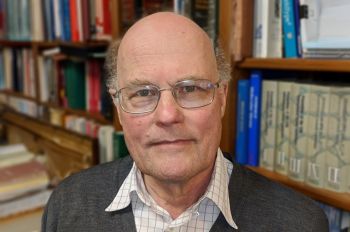2011 Kilpatrick Lecture | George Whitesides
Generous support from the Martin and Mary Kilpatrick Lecture endowment helped the chemistry division to have an extremely successful Kilpatrick Lecture in Fall 2011, attracting 300 attendees from academia, industry and high schools. The annual Kilpatrick Lecture has become a signature event for IIT, the College of Science and Letters, and chemistry. Over the years, the Kilpatrick Lecture endowment has allowed us to bring a broad spectrum of chemists from around the world to share their research and experiences with the IIT community.
[from left] Aditya Unni, George Whitesides, M. Ishaque Khan, Adam Hock
George Whitesides, Woodford L. and Ann A. Flowers University Professor at Harvard University, was our 2011 Kilpatrick lecturer. Whitesides, one of the most distinguished and world-renowned scientists, delivered the lecture “Reinventing Chemistry.” He also led a panel discussion, “Solving Problems or Satisfying Curiosity,” with Chemistry Professor Ishaque Khan, CSL Dean Russell Betts and Armour College Dean Natacha DePaola.
Of particular interest to all of us was that the year 2011 was the International Year of Chemistry as designated by IUPAC (International Union of Pure and Applied Chemistry) and UNESCO (United Nations Educational, Scientific and Cultural Organization). It forced us to reflect on the contributions of chemistry to humanity, the development of society, and our understanding of matter, and the future direction of chemistry as a discipline to further those endeavors. Reflecting these larger issues, this event was slightly different from our traditional lecture series with strictly scientific talks in that this year, we had a poster session presenting some of the recent research and scholarly work in chemical science by faculty and students at IIT and the panel discussion to address some of the larger issues that will direct the field of chemistry and possibly science for years to come.
George Whitesides delivers the 2011 Kilpatrick Lecture
Keynote lecturer Whitesides has made his mark in the frontiers of basic and applied sciences and has had one of the most prolific careers in science. Over his half-century of chemical acumen in academia, industry and within a variety of governmental organizations, Whitesides has achieved an international reputation for his expertise in the technical and policy-based direction of chemistry and science in general.
Morning Session
This session provided an overview of what the role of chemistry has achieved in the last one and one-half centuries and a look toward what chemistry should be directed toward in the next century. How can overarching societal problems be solved, and can we continue on the same path as the last century? How do we serve the community that supports science, and what are our responsibilities in making the most of those resources? How has the change in research and development priorities within industry and governmental organizations altered university stewardship of solving fundamental problems in science, and how should the next generation of young scientists be educated? Chemistry is certainly not a dying science, but one in a state of transformation that will require a conscious change in the way we educate and do research in order to thrive in the 21st century.
Poster Session
After lunch and prior to the afternoon session, students and faculty gathered in the MTCC Ballroom to view over 30 posters illustrating the research of undergraduate, graduate and post-doctoral students at IIT. The poster session represented each of the main branches of chemistry, as well as the cross disciplines such as bioorganic chemistry, materials chemistry and chemical physics.
Panel Discussion Session
Whitesides, Betts, DePaola, and Khan discussed the issues raised in the morning session and provided perspective on the differences in the physical sciences and engineering. Among the many topics discussed were the direction of academic research, the peer-reviewed process of awarding grants, and where the different disciplines can define their boundaries.
Attendees of the 2011 Kilpatrick Lecture with George Whitesides [front row, center]




